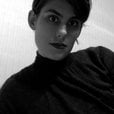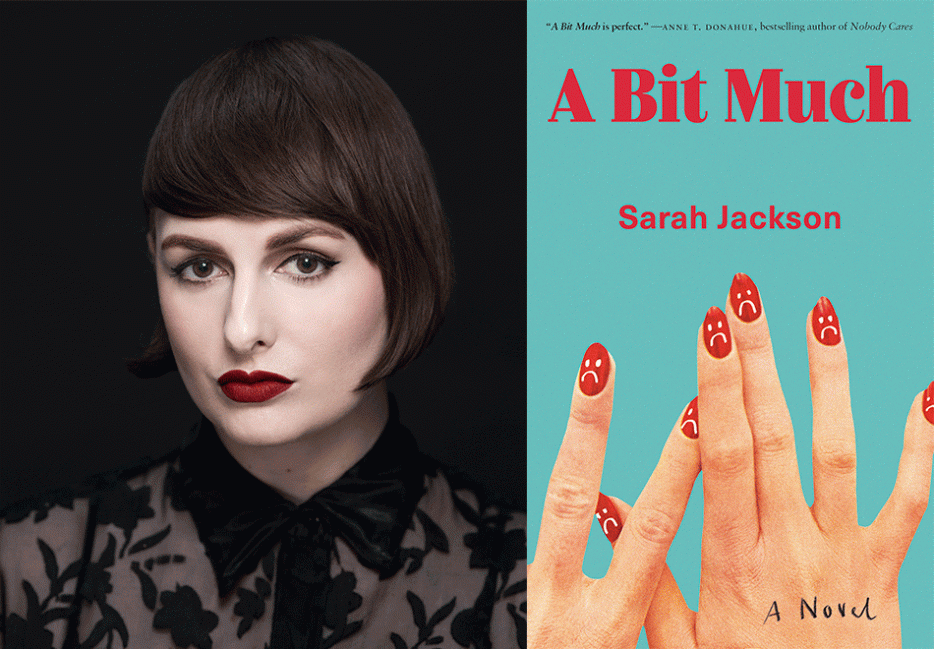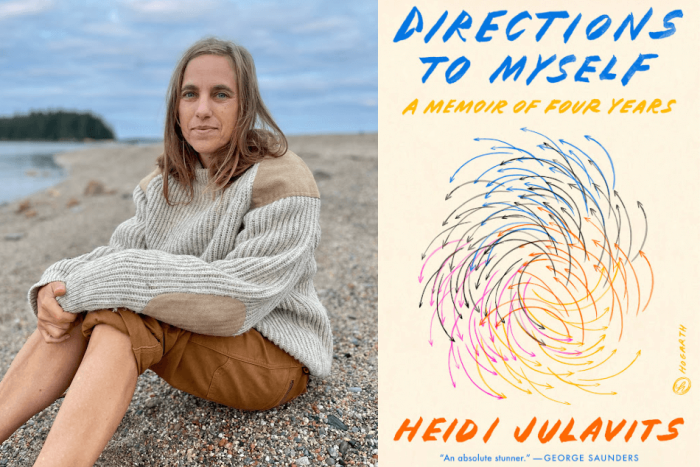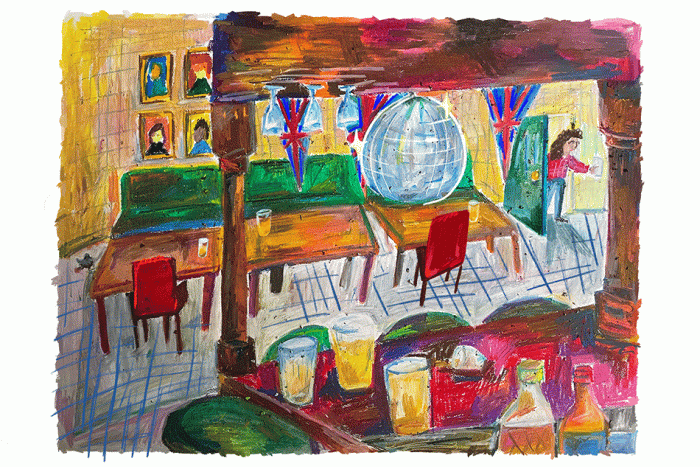Alice, the twenty-four-year-old protagonist of Sarah Jackson’s debut novel A Bit Much (Penguin Canada), is going through it. She is newly unemployed, in the throes of a deep depression, and just barely keeping it together enough to show up for Mia, her roommate and childhood best friend who is currently hospitalized for cancer treatment. Torn between who she wants to be, who she thinks she needs to be, and who she is, Alice is stuck in an existential rut, turning to old films for guidance in her formless days, trying to maintain some degree of normalcy for Mia’s sake, and keeping everyone else at an arm’s distance.
Sarah Jackson and I had been on each other’s radars, as my own debut novel about a mentally unwell twentysomething in Toronto was published a few weeks before hers. We showed up alongside each other on listicles and Instagram roundups under shared hashtags (#sadgirlreads). I understand the impulse to lump books together by theme, though to assume they cover the same territory does a disservice to what makes Sarah’s work so unique. A Bit Much is a novel about someone striving for a meaningful life getting trapped by the banalities of depression. There are infinitely different ways to be a woman, and nearly as many to being a woman on the cusp of adulthood and on the verge of a nervous breakdown.
This interview was the first time Sarah and I interacted directly. We videoconferenced on a weekday morning. I wore a sweater over pajamas; she joined the call with a perfectly styled Louise Brooks bob and immaculate dark lipstick. We spoke right until the moment we had to leave to go to our other jobs.
Anna Fitzpatrick: It's fun Googling you ’cause there are a lot of Sarah Jacksons.
Sarah Jackson: Yeah.
There are so many Anna Fitzpatricks too, and I feel bad because they're, like, brilliant academics and I'm messing up their SEO with my horny little novel.
There are so many Sarah Jacksons. The place where I get my stuff to do my hair, they're like, “We have three Sarah Jacksons. Which one are you?” I made my author website Another Sarah Jackson. There are many of us.
I was Googling you to make sure I had your biographical details right. You're also in Toronto, right?
I lived in Toronto until like two months ago. I'm in Guelph now. I grew up here. Well, most of the time here. That also makes me sound suspicious. But yes, I moved to Guelph recently but I still work in Toronto.
And you’re an editor at Penguin Random House.
I'm an associate editor. I work on books. I started as an intern in January 2015. I was on contract for quite a while. I wouldn't say I climbed the ladder. I took a few steps.
What's that been like, as someone who has worked on books behind the scenes, and now you are the book maker? The writer, if you will?
It's weird. I think that because all of this happened during the pandemic, I haven't experienced the full strangeness of it. People in our office didn't know that I also like to write, just because I'm very secretive and a nervous person. I haven't really been in an office with everyone; we were all working from home. I didn't really experience people's reactions to it, I guess. I like that, because I felt some control there. Although it's been weird, because I'm on the other end, I know how it works. I knew what to prepare for, in some sense. Every publishing experience is different, but it helped me prepare for sure.
I was editing books while working on my own edits. I was very good at being like, We're not going to think about my own book today, and just focusing. I have to do it like that. I have to pretend my book doesn't exist while working on others. That was a really long answer.
No, it's great, the longer answers you give the fewer questions I have to think up. I've been doing interviews for Hazlitt for, like, a decade now. I was an intern, too. They let me do all these big interviews, bless them. I'm looking back, and there were times where I interviewed Pulitzer Prize-winning novelists when I was a baby dumbass, and I would ask them things like “How was this book based on your life?” And “How are you this character?” Now, having my own book out, I'm mortified that I asked so many iconic writers that.
I should say, I read some of your earlier interviews, and I thought they were really good, and I'd be super intimidated asking those questions.
Well, thank you! I think it was just youth. I didn't know enough about when to have shame. But anyway, how is your book based on you?
I mean, I've been asked those questions already, of course.
Yeah, and it's like, “Well, every character in my book is based on me! I made them!”
Yeah. They came from me, so.
People think you transcribe your diary and it's like, no, I did do some writing.
“I made some stuff up, but it's just based on a straight memoir.”
So, I'm interviewing you now but I'm also using this to retroactively apologize to everyone I've ever asked that to. But anyway. You wrote a book! Congratulations! It's wild.
It is wild! Congrats to you as well.
Thank you. How's life been since publishing a novel?
It's both been very, very strange and extremely normal at the same time. I'm curious what your thoughts are.
About the same.
I think the months leading up were, I was just really terrified for sure. Excited, too, but the terror took over a little bit more. It was weird leading up to it thinking, Oh my god it's a month away . . . three weeks away. There was a countdown. The launch week, it was just wild seeing my book in bookstores. People I didn't know personally were posting about it or messaging on Instagram. It was really strange, but it was very exciting for me. At my launch, I remember, I thought I was very in control, and as soon as my editor introduced me and said one nice thing about me, I just started to cry. [laughs] I was like, “I can't look even look at you for the night. You are my trigger.” I love my editor, but it had just built up. It was all released at my launch. It's also like, my life hasn't changed that much. It's a very exciting thing and sometimes I forget it exists. I'm never going to get over seeing my book in a bookstore. I never thought that that would ever happen. I'm so happy that I'm numb sometimes, and then other times I'm like, My life is the same. What about you?
I started writing my book in 2016, published it in 2022. It went through a lot of changes. It's wild realizing that it's not just mine anymore, and people will have their own interpretations of what it is about. I don't think my book is subtle. It can be pretty blunt. The ways people have responded to it have required me to give up some control, to abstain from going, “No, that's not what I was trying to do there!” Just realizing that, no, it's their book now.
That's something I experienced as well. I'll see someone who has tagged me in a review and I'm like, “Oh. I wasn't going for that, but if it works for you, cool.”
I've been featured on so many #unhingedwomen book roundups on social media. They'll feature like, Gone Girl, Sylvia Plath, and then my book. Again, I'm excited that people are excited about books, but I think those are all doing very different things. But yeah, I understand the appeal of wanting to cultivate a vibe.
The TikTokers, the BookTok people, they love the vibes.
It is alluring. Which segues into my next question. Alice, the protagonist of your book, loves a vibe. She was an English major, but when we meet her she's in the throes of a depression and a lot of her cultural references are movies. A lot of what she tries to model her life on, sometimes in really subtle ways, are directly lifted from actresses and film aesthetics. What role do you think films play in her artistic formation?
So, for Alice, she has all these expectations and she doesn't know what to do with them. There's a line in there, it's a dig at [her friend] Dylan for having unrealistic expectations because of the movie Before Sunrise, but that's also Alice. It's hard for her to think, “This is a person I could see myself dating. This is a job I could see myself doing.” It's not this ideal. She wants to be this big writer. She wants to have an amazing perfect romance, even though she would never admit that because it's embarrassing. All of it is embarrassing. I think even though she makes digs at other people for being unrealistic or pretentious or whatever, she has this fantasy, and she's like “I like [this star] when XYZ happens and they reflect the movie, and I have incredible movie hair,” whatever. I also think that she likes to show what she's taken in. She wants others to know what her tastes are. I did the same thing with music. With music I was making my own soundtrack for the book. I think how she thinks about movies is accurate for a lot of people in their early twenties or teens.
By the time the book starts, she's in this huge transitional period, but you get the sense that she's been looking to Mia for so much, and then when Mia's not available she's got to put that energy elsewhere. A lot of that cultivates into this depression, this not leaving the house, not showering, blowing everyone off. But she's still able to turn to movies.
There's a line about watching movies with Mia, but again Mia is more of a socially outgoing person. If she's not always going to go out with her, she will spend a lot of time watching films by herself.
Movies and Real Housewives.
I think it was Real Housewives of Beverly Hills that I ended up making her watch. I watch a lot of the Real Housewives. It was Beverly Hills but it took a while to decide which one Alice is rewatching. I think the reality TV is because she's watching a lot of wealthy women have their problems, which have nothing to do with her problems, and it's a good way for her to turn off her brain.
It's a realistic portrayal of being in a depressive state where it's not an aesthetic, it's not beautifully curated. It's not getting out of bed.
Thank you for noticing that. I didn't want it to be—there's no goals here. A lot of people messaged me and said they related, and said they felt understood, and that made me feel great, ’cause that's what I wanted with the book. She's unhappy, and her apartment reflects that. There's half-eaten soup, hot sauce stains everywhere. It doesn't capture a vibe. It wouldn't be on Instagram.
I was thinking about how anticipatory grief presents itself. Alice and Mia have gone back a long time—they've known each other since they were four. Mia is thinking a lot about what the likely outcomes to her illness will be, whereas Alice is, maybe for Mia's sake, trying to have this optimistic outcome of what things will be like when she's better. But Alice is still grieving for her friend in her way.
I was trying to make it so that Alice is always fighting between these two, like the thought in her head that something bad is going to happen—well, something bad is already happening, but something worse, where Mia's not in her life anymore. I don't know why I'm just not saying she's worried she's going to die. She's constantly thinking of it, but she's also stopping herself from thinking about it. I think she won't let certain words come up in her head. She's doing her best job compartmentalizing, but there are parts in the day where you can't do it. I think when she's trying to sleep it's really failing for her. It's hard for her to concentrate. She's trying to be positive, she doesn't want to get to that really dark spot, so she's in this in-between spot where she can't do much at all. She's off.
I wanted to talk about the title, A Bit Much. We're in Alice's head, and we see all her insecurities, all her judgments, all her contradictions. But we also see this relationship with her high school friend Anne, who she sees as being a bit much in her own way. Mia is someone else who is going through this big trauma and is simultaneously apologizing for where she's at. All these characters are so wildly different, but they all have their own much-ness bleeding into each other. Some of it is relatable and some of it is exhausting when seen from Alice's point of view. What does a bit much-ness mean to you?
I think a bit much-ness—well, Alice would say something different. I think she only really worries that she exhausts Mia. She sees other people mostly as too much. She thinks all of Anne's friends are pretentious phonies. I think everybody in this book could have their bit much-ness thrown at them. I don't think it can be a bad thing. I think it's who you are, and it can be hard to reign in sometimes. Alice will try around Mia, not so much around other people. I also think, what I was doing with the title—I mean, I say I think, but I know—I was playing with what they are experiencing. It's a bit much. It's too much. I think everybody, at some point, gets told they're being too much or worries that their personality is annoying or exhausting. Maybe not everybody. A lot of people.
Especially when you're in a character's head, and it's unfiltered. You see what Alice says versus what she thinks.
Yes. The reading experience is a bit much, for sure. [laughs]
Why do you say that?
Well, like you said, she's unfiltered. You're getting all her thoughts at once. She's not always consistent. She'll also sometimes say, “I'm going to do this,” and she doesn't do it. She's a frustrating person, she's a frustrating character. I would be shocked if someone told me they read it and the whole way through they never got annoyed with her. I don't believe that. But I just wanted to really take this character the whole way. Dip into her mind. It's her interpretation of things, which isn't necessarily . . . she thinks of herself as being very self-aware but sometimes she's clearly, you know, not. Or she's being judgmental, or being too hard on herself. It's an unfiltered unleashing of thoughts. I do love Alice. I love her, but I also want to talk to her and help her through some things.
She thinks she's self-aware but, as we were discussing before, she wants to model her life on movies. She'll call out other people for showing up to a party in a Halloween costume where they might not understand the reference and just thought it looked cool, but she'll also cut her hair in a way she saw in a movie because she thinks it looks cool.
It's OK when she does it.
Because she understands the reference. That's her framework.
She understands the reference. She doesn't like when people are being arrogant, but she definitely has her arrogant moments.
It manifests differently in her but—
But she ignores it.
What were some formative books that you read when you were first thinking about your literary ambitions?
Like you, I had been working on my book, or a book, for years. It's kind of a long story but I wrote little bits of ideas of characters or conversations. I really like to write fight scenes. Like, arguments, not shooting movies.
It's like you're playing out an idea, when you can argue both sides and give them voices.
I honestly have been doing that since I was a kid. I loved to watch melodramas. I loved Party of Five when I was ten. I loved huge emotions. I know this is going way back. I would always write ideas for things, just lines, people yelling at each other. I love confrontations. I used to always imagine myself confronting other people. It never happened. It never had to. I was making up scenarios in my head. Loved to explore tension between people. So, I've had notes forever. It's just a confidence thing, where I was like, I can't write a book.
I wrote the first chapter of this book in 2010, and I put the book away for years at a time. Just dropping in, like, this is never going to go anywhere so whatever. Or I was just getting busy with work.
I would say, when I was in my early twenties, two books that I read that were really exciting to me were A Complicated Kindness by Miriam Toews, because I loved how she balances humour and heartbreak in her stories. The balance of those two, that's what gets me most excited about writing. And then How Should a Person Be? by Sheila Heti. I read that I think two months after I had written a chunk of my book, and I was just really excited about how she was writing. I was like, “You can do this?” I had just gotten out of university and had read mostly the classics. I was trying to figure out what my tastes were. Those books were both really exciting for me to read.
Movies have always informed my writing. I was such a TV kid, such a movie kid.
What are you reading now?
OK, so I actually just finished your book.
Let the reader know I was not setting you up with that question.
I was like, maybe you're going to feel awkward about it, but I'm going to tell you, because I did love your book.
Well, thank you.
I just finished that. I recently read Dogs of Summer. I have read the first page of Fleishman is in Trouble. I've been busy with work. I have a huge list of books I want to read next. I know I have to read books that I'm editing.
It's hard when your job is in publishing. When your work is reading, you're always aware of the books you aren't reading.
Yeah. I also have submissions that I must read. But it's nice.






